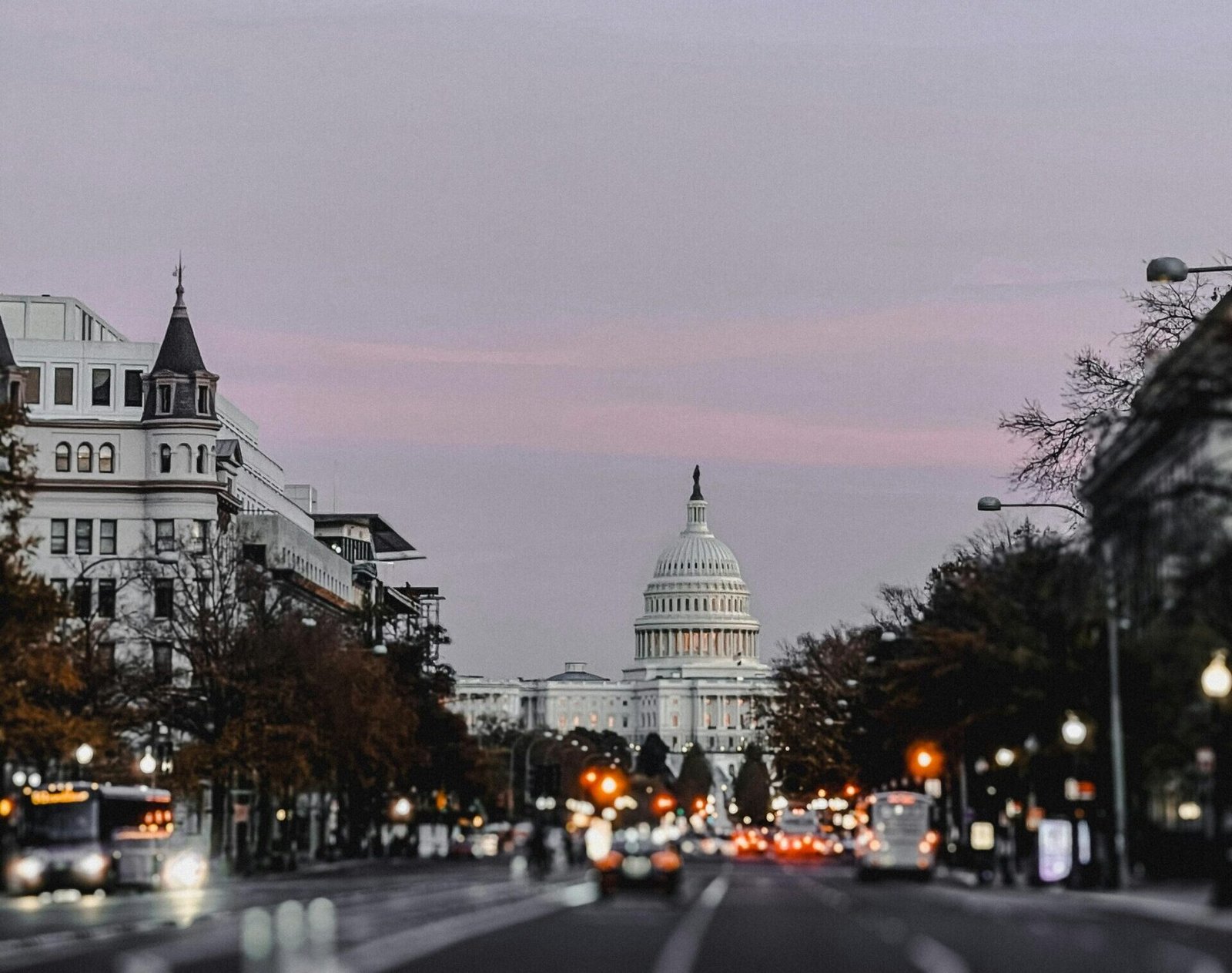Here are some impressions from 12 German journalism students on a three-week European Recovery Program (ERP) Transatlantic fellowship with the RIAS Berlin Commission to the United States. The 12 students spent one week together as a group in Washington, D.C. before spreading out in smaller groups of two to three to five different university towns in the United States. The goal of the ERP program is to help connect young German journalism students with their peers in the United States and help aspiring journalists in both countries learn more about journalism training in each others’ countries. The ERP program is supported by the Transatlantic Program of the Federal Republic of Germany. It is funded by the European Recovery Program (ERP) of the Federal Economy and Energy (BMWi) Ministry.
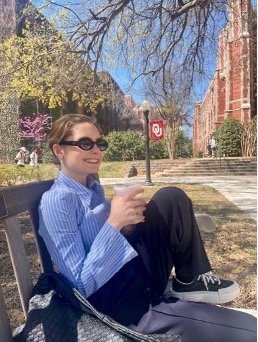
Rosalie Elli Scholz, University of Applied Sciences Magdeburg-Stendal
My view of the USA has changed. It was an intense three weeks that will stay with me for a long time. Our journey began in Washington DC: This first week was marked by conversations with smart people from politics and the media about the current challenges journalism has to face in the United States. These were conversations that often left me speechless and thoughtful. “Land of the Free?” – once upon a time, it seems. I kept asking myself how, in a country where democracy was once so highly prized, fundamental values such as freedom of the press and freedom of speech could be losing their value. What gives me hope is the awareness among journalists that they cannot be intimidated by authoritarian forces – this also came through in the conversations. The first week sensitized me to be aware of my responsibility and task as a future journalist as a critical, neutral observer. I was also pleased to have the opportunity to visit the Mattaponi tribe in Virginia and learn about the lives and challenges of Native Americans. After a week in the nation’s capital, our journey took us across the country to Oklahoma. We spent two weeks at the famous Gaylord College for Journalism and Mass Communications. The students and professors welcomed us warmly and gave us many insights into student and campus life. In OKC, we really felt what it’s like to be an American: visiting a farm, going to a NBA game and eating food with way too much fat and sugar – we really got the full experience. I am especially grateful that I got to spend a day shadowing reporter Dacoda Wahpekeche at the State Capitol. Thank you, RIAS, for letting me be part of this journey!
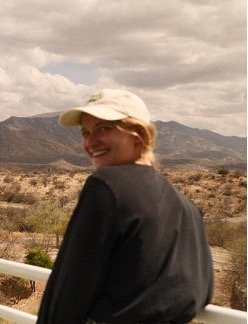
Elena Dominick, University of Applied Sciences Hannover
Ever since I was eleven, I’ve wanted to become a journalist. Back then, I believed words could change things. That naive idealism has started to falter: trust in the media is declining, populists are dividing our societies, and facts have suddenly become negotiable. Just before our trip to Washington, the headlines from the Capitol started to escalate—layoffs, ignored court rulings, and deportations. “Flood the zone with shit”—the strategy seems to be working. Admittedly, I was already feeling a bit dizzy before our first meeting. But then, we met people who gave us hope. For a week, journalists, think tanks, and political actors generously took time to answer our questions. We talked about journalistic responsibility, how the media might regain public trust, listened to analyses of Trump’s second election victory, and wondered why the opposition remains so silent. “The looming constitutional crisis” hovered like a Damocles sword over nearly every conversation. The mood was uncertain, tense—yet deeply inspiring. We sat across from people who, with remarkable clarity, stand up for an informed public and made it clear: it has never been more important to counter hate and division with facts, balance, and care. The following two weeks in Tucson were equally unforgettable, thanks to our incredible host and their colleagues: from a trip to the Mexican border, visiting a fire department, meeting Arizona’s governor, to desert hikes, ice hockey, and line dancing. The diverse program and countless encounters gave us the chance to learn so much about this fascinating and diverse country. I was able to shed some of my biases — and realize once again: it’s always worth listening. Because even from people whose worldview is far from mine, I was able to learn a great deal. With every answered question, at least three new ones emerged and I truly hope this was not my last journey to the U.S. Thank you, RIAS, for this truly transformative experience!
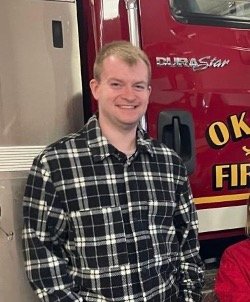
Melvin Thum, University of Applied Sciences Magdeburg-Stendal
A thriller in prime time – that’s probably the best way to describe what three weeks in America with RIAS felt like. The Trump administration is revoking the accreditation of several journalists for the White House, using the Alien Enemies Act of 1798 to justify deportations, signing laws by decree in series, and the media landscape is barely keeping up with Trump’s speed – and we are right in the middle of it all. In our many conversations with journalists, you often hear uncertainty. “Can we still report from the White House in the future? How do we regain the trust of our audience? Is the freedom of the press still being upheld?” At the same time, the Trump administration is massively cutting funding for Voice of America, effectively squashing the broadcaster. After turning my back to Washington D.C. I experienced a change of scenery that could hardly be more contrasting: from bustling cities to the Great Plains, interstate highways as far as the eye can reach, and Route 66 – Oklahoma. A deep red state that lives primarily from agriculture and oil and gas production. At the University of Oklahoma, I was able to experience everyday life on campus and took a look at the impressive production of OU’s in- house news program “OU Nightly”. The exchange with American students and professors was incredibly insightful. At the Oklahoma State Capitol, I had the opportunity to have in-depth conversations with several members of the legislature and also came into contact with many courteous people out in the countryside. If Washington and Oklahoma have only one thing in common, it was one emotion, repeated over and over again: uncertainty. We live in tumultuous times, paved with wars and crises. Many people feel powerless, uncertain and divided about what direction their country should develop. Visiting the States at such a time was a once-in-a-lifetime experience. Rarely have three weeks felt so short.
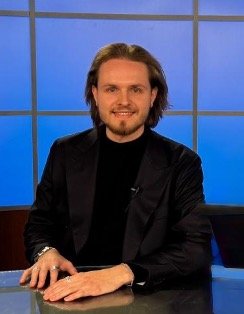
Max Beckmann, Media University of Applied Sciences Berlin
I’ve never been to the United States before, but now I look back on three remarkable weeks filled with inspiring conversations, unforgettable moments, and countless new impressions. It was a journey that offered not just a glimpse into American society and politics, but also into everyday life far beyond the headlines. My first stop was Washington, D.C.—a city that instantly impressed me with its scale: wide streets, big cars, and a constant buzz of activity. During the week our group visited NPR, met with Washington Post journalist James Hohmann, and even had the chance to explore the Capitol. One of the most memorable moments was a conversation with Diego Sanchez, Director of Policy and Strategy at the Presidents’ Alliance. He spoke with great insight about the challenges faced by immigrants and people with migration backgrounds in the U.S. Another standout experience was meeting JJ Green from WTOP. He encouraged our group to remain resilient in the face of the growing societal and political pressure on journalists. His message was clear: keep fighting for facts, independence, and the truth. Keeping that in mind, I traveled to Bloomington, Indiana—a city that may be small by American standards, but made a big impression on me. For two weeks, I was a guest at Indiana University, where I encountered a very different side of the U.S. Here, I had the opportunity to connect with people outside of national politics or media, and experienced campus life firsthand. A major highlight was my time at the radio and TV station WFIU/WTIU. Alongside Kean Kalinowski, I had the chance to sit in on radio broadcasts and TV productions, gaining valuable insights into local journalism and media work. I was genuinely surprised by how advanced the university’s facilities were, how diverse the student body was, and how strongly the campus was woven into everyday life. Looking back, I now feel I have a much clearer understanding of the U.S.—not just politically, but socially and culturally as well. Most importantly, I met incredible people along the way, many of whom I hope to stay in touch with. A heartfelt thank you goes to Christina, Pam, and Chris for organizing our stay in D.C., and to Sara for making the two weeks in Bloomington so enriching. Finally, I want to give a special shout-out to two amazing students from Bloomington — Isabella and Elyse — without whom I wouldn’t have gotten from one appointment to the next so smoothly, or felt so welcomed into American life. Thank you both for everything!
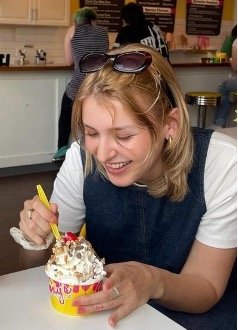
Marianna Hene, University of Applied Sciences Magdeburg-Stendal
When we arrive in Washington in mid-March, the U.S. feels like a wild place. Donald Trump has been back in office as president for a few months. Just a few days earlier, a meeting between him and Ukrainian President Zelensky at the White House had escalated. At the same time, a new trade conflict with China is beginning. Domestically, tensions are rising: certain journalists are being denied access to the White House, and protests are erupting across the country. It’s a highly interesting time to visit as a foreign journalist. During our first week in Washington, we visited several newsrooms and spoke to a wide range of people—editors, correspondents, members of Congress. The conversations are open and honest —but often also unsettling. Press freedom is under pressure, the political climate is tense, and the country feels deeply divided. I find myself in a small bubble: a group of people who want to draw attention to grievances, who want to make a difference—but aren’t being heard enough. These days made clear: journalism needs more solidarity, especially transatlantically. On both sides, we’re working toward the same goal—clarifying, making visible, telling the truth. After an intense week in Washington, we fly out to our universities across the country. For me that is: The University of Oklahoma. While the capital still felt somewhat familiar, almost European, Oklahoma is the cliché version of America: cowboys, guns, endless fast-food chains. Everything is at least twice the size of what I’m used to in Germany: Cereal boxes, cars, even the distances. We spend time on campus and get a look behind the scenes of the university’s newscast “OU Nightly,” that airs Monday through Friday. We attend a NBA basketball game of the OKC Thunder, visit a local high school, and talk about education policy in a state that consistently ranks at the bottom nationally. That, too, was a raw and impactful moment. After two weeks, saying goodbye is harder than expected. I take home so many impressions—and even more unanswered questions. But one thing is clear: I want to come back. Thank you, RIAS, for these insights.
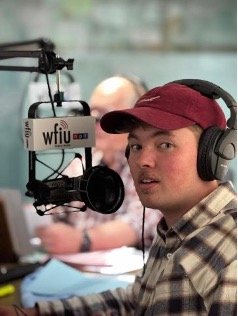
Kean Kalinowski, Free University Berlin
The RIAS program felt like stepping into an entirely different reality for three weeks. What made this exchange so special was its depth and versatility. In Washington D.C., we met with journalists and often visited newsrooms such as CNN, NPR, NBC 4, WTOP Radio, and The Washington Post. We spoke with reporters from the White House press corps and engaged in discussions with think tanks like the Cook Political Report and New America. Even our visits to the Mattaponi Tribe and the German Embassy showed just how broad and diverse the program was. Equally impactful was the connection among us RIAS fellows. We bonded quickly by sharing meals, exploring museums and comedy shows, and often diving into deep conversations after our official meetings. The atmosphere was marked by warmth, curiosity, and openness. The sense of community that emerged reached far beyond the confines of the program. At Indiana University in Bloomington, we spent two weeks gaining hands-on experience. We joined the campus radio team for interviews with a Nobel Peace Prize laureate and a local representative, took part in live radio broadcasts, and created our own segments. In addition, we attended courses on teleprompter reading, media law, ethics, marketing, and investigative journalism, offering us a real taste of American student life. Our experience was rounded off with baseball games, conversations with American students, and spontaneous little adventures. RIAS not only gave me a deep insight into U.S. journalism, but also reminded me how inspiring and meaningful professional exchange can be.
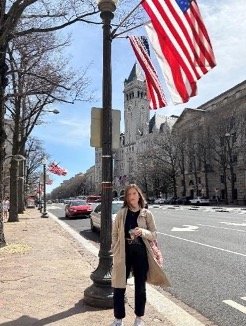
Jette Minks , University of Applied Sciences Magdeburg-Stendal
What a ride! Three weeks in the USA, six states, numerous encounters and all this at a time that couldn’t be more exciting and unpredictable. The news that you usually only watch on the sofa at 8 p.m. on the dot and that seems so far away is now happening just a few meters away in real time. Our first week in Washington has shown how divided and how tense the country is looking at itself, how journalists fear for their future and how the USA is currently changing at a speed that is hard to grasp. Conversations with journalists from WTOP, CNN, NPR and NBC 4, among others, have changed my view of the importance of journalism for a stable democracy. The freedom that we often take for granted in Germany is now a matter of concern there. But there is also a ray of hope for the future of journalism in the USA. I found it in a place where you probably wouldn’t expect it at first – Nebraska. At the University of Nebraska in Lincoln, I was able to accompany journalism students in their work for two weeks and saw the enthusiasm and optimism with which news is made and how aware they are of the critical situation. As someone who comes from rural Saxony-Anhalt, Nebraska, with its seemingly endless fields, felt almost like home. This feeling was only enhanced by the incredibly open and friendly people with their “Nebraska Nice”. I can’t count how many people I spoke to, how many different ways of life I got to know and how many different perspectives I experienced. Three weeks in the USA, six states and numerous encounters that have changed and shaped my view of this country that always seemed so far away.
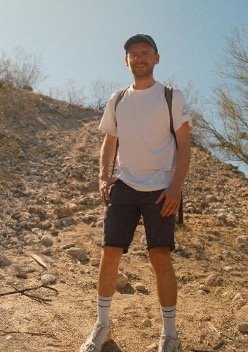
Jan Sören Schmitt, University of Applied Sciences Magdeburg-Stendal
A chaotic time in a very interesting country! With news from the White House every day, journalistic work is much more strenuous than it was under President Joe Biden. Just a few days after we had answered all the passport control officers’ questions at the airport, the news broke that a German student had been prevented from entering the country and had been detained. I felt a little anxious, but also relieved that I had made it through immigration control despite the strict entry regulations. It was the first time I had to worry about this with a German passport. Nevertheless, Washington D.C. is an experience that anyone interested in politics should have had. Besides informative conversations with people from politics and journalism, we also spoke to people who had recently lost their jobs as government employees. A week full of impressions didn’t seem to be enough in the city where world politics is being reorganized. From the mild north, we continued on to Tucson, Arizona with its incomparable campus life. Warning: it can get up to 97° Fahrenheit (approx. 36°C) as early as March. With national parks lined with cacti and brilliant Mexican food, the city exudes Latino flair. Our colleagues from AZPM, who showed us around the region, local political institutions and publishing houses in the region, also contributed to the enjoyable stay. Many thanks to our host Buzz as well as Sophia, Hannah, Zac and the whole team! Away from the station and the campus, Tucson impressed with its diverse bar scene. And bars are where the conversations that really matter happen. Because everyone here is the same and tells you about their dreams, joys and sorrows. This is where I learned what actually concerns many people who don’t feel represented in the media debate. I met everyone from protesters against the ‘broligarchy‘ to Trump sympathizers. I was warmly welcomed by everyone.
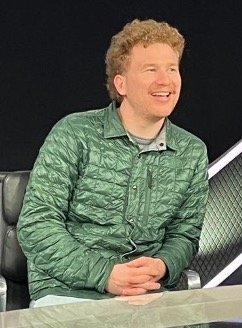
David Kirchner, University of Mainz/Sorbonne Nouvelle Paris
There is something very American about trying to summarize a three-week trip in a single best moment that simply contains or explains EVERYTHING. An almost impossible task for a European. But the Americans I met on my trip didn’t seem to understand that: They kept asking me, in a pleasantly curious way, what the one best moment of my first stay in the USA had been. And since I didn’t want to disappoint them, I came up with a strategy that consisted of giving a different answer each time. Here are my five single best moments: The only conversation I had with a Trump supporter, an Uber driver on the way from Athens, Georgia to Atlanta, who told me he would leave the country the moment a Democrat ever became President again, and went on explaining to me why he could never vote for a Democrat because “they are all narcissists”, unlike Trump apparently. ; When we had original southern BBQ with Jana and our host and RIAS fellow Faith at Fat Matt’s Rib Shack in Atlanta. ; The enlightening and honest conversation we had with James Hohmann, the Washington Post journalist who wrote the endorsement for Kamala Harris that owner Jeff Bezos didn’t want to publish. Hohmann explained to us why he believes Bezos has the goodwill not to bow to President Trump ; Visiting NPR’s newsrooms in DC, including the world-famous “Tiny Desk” ; The positive and confident spirit that prevailed at the local radio station WABE in Atlanta, and for me is not only representative for all US journalists I met, but extremely impressive given that the media landscape is currently under attack: Keep up the very good and important work! Finally, I would like to thank the RIAS Berlin Commission for giving me the opportunity to take part in such a well-organized, exciting and unique trip.
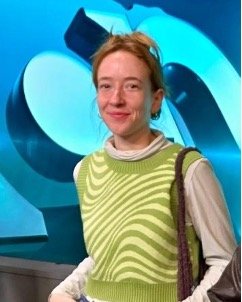
Clara Dünkler, University of Leipzig
“Nebraska Friendly” – that’s not just a saying, but also what we experienced. We were welcomed with open arms at the University of Nebraska in Lincoln. How did we end up in the Midwest of all places? This is the question we, the “Germans”, were always asked first. Nebraska is admittedly not the number one vacation destination, but that’s not what we were there for anyway. We wanted to get to know different sides of the USA during the three weeks of the RIAS program. What better mix then the capital Washington D.C. and Nebraska where there are three times as many cows as people? While being here we got lots of insights: a visit to the university’s own broadcasting channel, a trip far into the countryside to visit local journalists and a bill reading at the state capitol. And not to forget about sports: top interest for many. Although it wasn’t football season, we did get to see a baseball game – after two and a half hours we almost understood the rules. In Nebraska, everything feels far away. It almost felt easy to forget about what is happening in the White House. Only once did we come across a group of ten demonstrators who were taking a stand against the Trump administration. Quite a contrast to our first week in Washington D.C. The journalists we spoke to (NPR, CNN, Washington Post, among others) reported on the flood of news about new executive orders every day and the challenge for them as “legacy media”. The biggest concern for many: President Trump could ignore court decisions. It’s a turbulent time that the USA is currently going through. Thanks to RIAS, we were able to experience this first-hand.
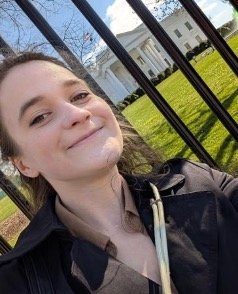
Katrin Engler, Free University Berlin
“Please tell your German friends, we are not all like this!” – I heard this sentence more times than I can count during my trip through the U.S. The people I met were open, curious, and – honestly – incredibly excited to talk to someone from Germany. A bit too excited, at times. What left a lasting impression on me was the way American journalists speak about their colleagues. There’s praise, support, and encouragement – no jealousy, no cynicism. If we could bring even half of that energy into our media industry back home, the job would feel a lot more human. Local journalism in Arizona hits differently. “Local” means driving three hours through endless desert and cacti. And yes, the landscape is just as stunning as it sounds. One moment that really stuck with me was visiting the U.S.-Mexico border. The massive fences reminded me of the Berlin Wall – including the death strip. Except here, people seem less ashamed of what that wall represents. This trip was intense. Full of contradictions, but also full of inspiring conversations. It reminded me how meaningful true exchange can be – professionally and personally. And I can’t end this without saying: We were welcomed with such kindness and generosity by our host Buzz Conover and the whole team at the news station. Their openness and warmth made this experience even more unforgettable.
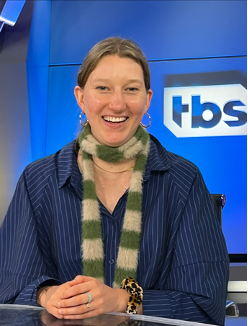
Jana Herrmann, University of Applied Sciences Magdeburg-Stendal
“God bless the USA” – is written in huge letters on a highway billboard somewhere outside Washington, D.C. Below it: Jesus, holding his hands protectively over Donald Trump. Welcome to America! For three weeks, I traveled across the U.S. with fellow journalism students – right in the middle of political upheaval. Experiencing it all live felt a bit like binge-watching a series where each episode gets more absurd, but also more gripping. Episode one: Washington, D.C. For a week, we rushed from one appointment to the next – from think tank talks to election forecasts to Q&A sessions with journalists from major news outlets, discussing polarization, objectivity, and the future of journalism. The debates were heated, the rooms ice-cold – air conditioning here is practically a sacred institution. The mood in the capital was tense but determined. No one wants to give up their country without a fight. My personal highlight: a visit to the Mattaponi tribe, whose federal recognition is hanging by a thread. Episode two: Just arrived, and I’m already packing my suitcase again – this time for the deeply conservative state of Georgia, in the south. I meet warm, welcoming people who drive massive trucks to university (height: at least 1.30 meters), walk across a campus straight out of a high school movie, and feel firsthand that access to education in the U.S. is often a matter of money. The season finale: a week in Atlanta, Georgia’s capital, the birthplace of trap music – and of Martin Luther King. Between a megachurch in an old furniture warehouse, classic southern barbecue, and the historic sites of the civil rights movement, it becomes clear once again how closely extremes coexist here. Now I’m back home – but my head is still somewhere between D.C. and Georgia, searching for the right words. Thank you, RIAS, for three intense, crazy, and incredibly exciting weeks I’ll never forget.
